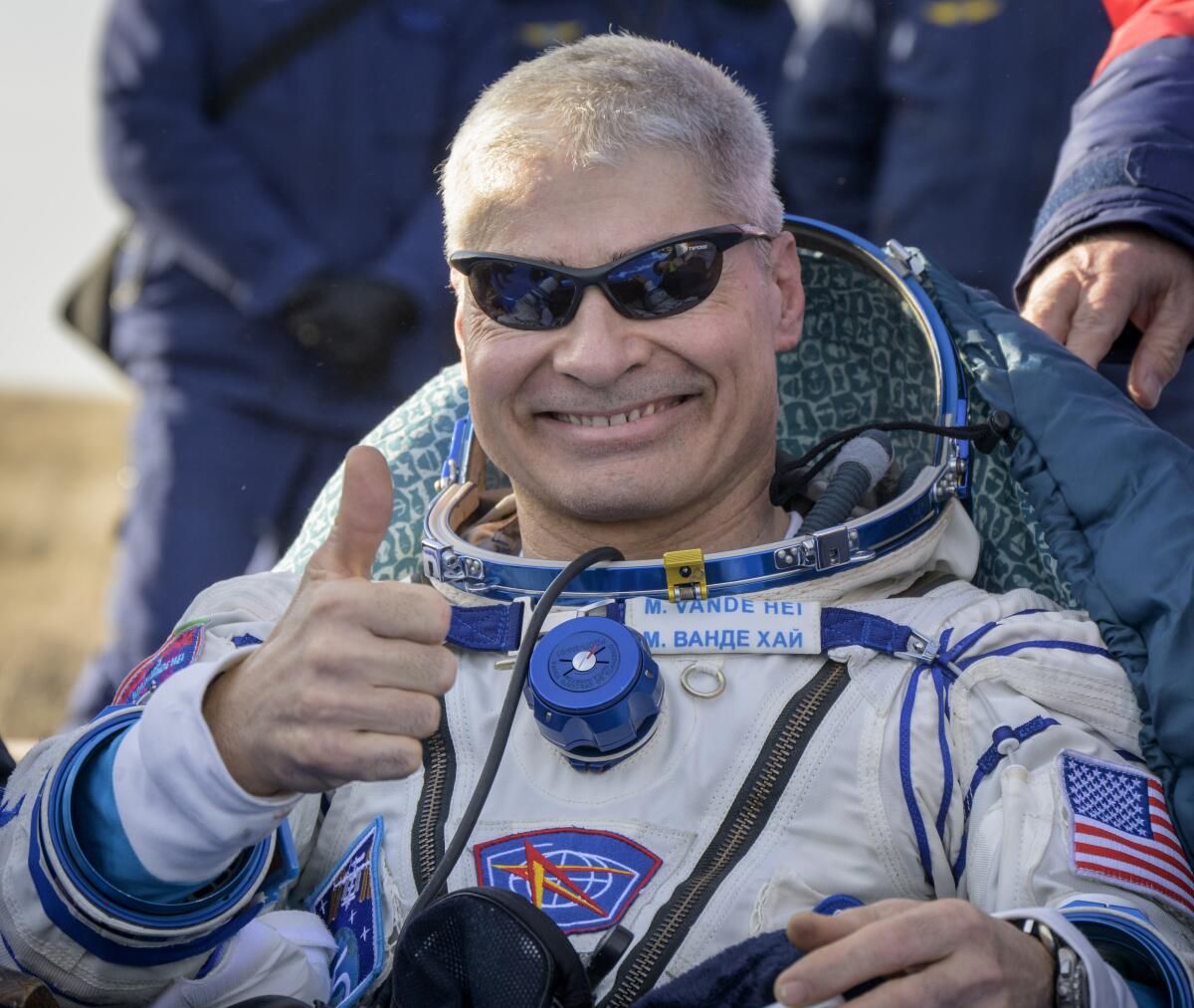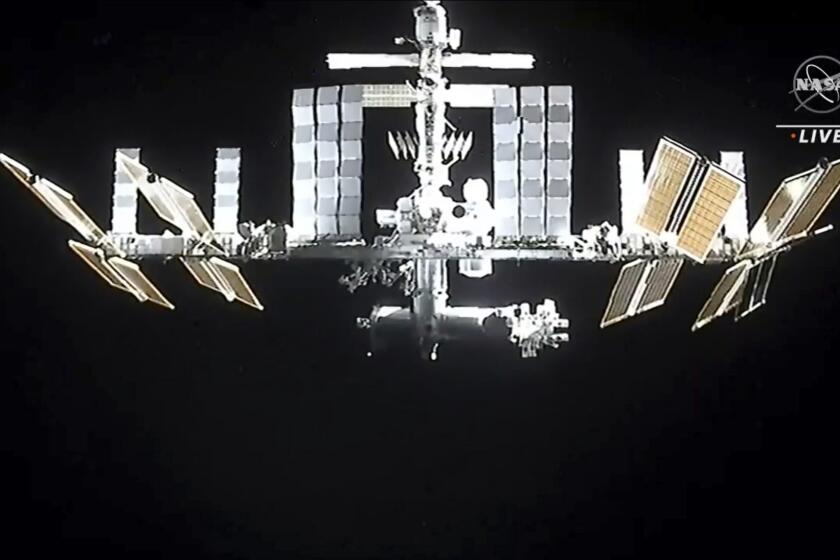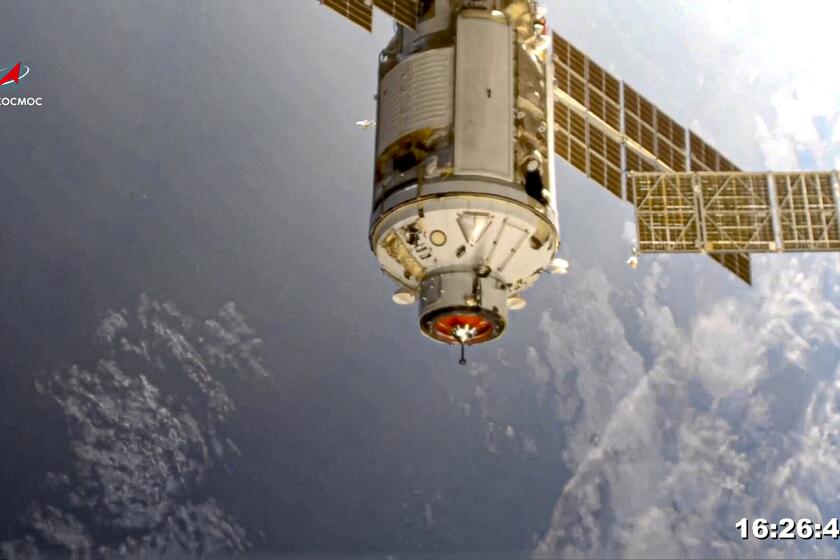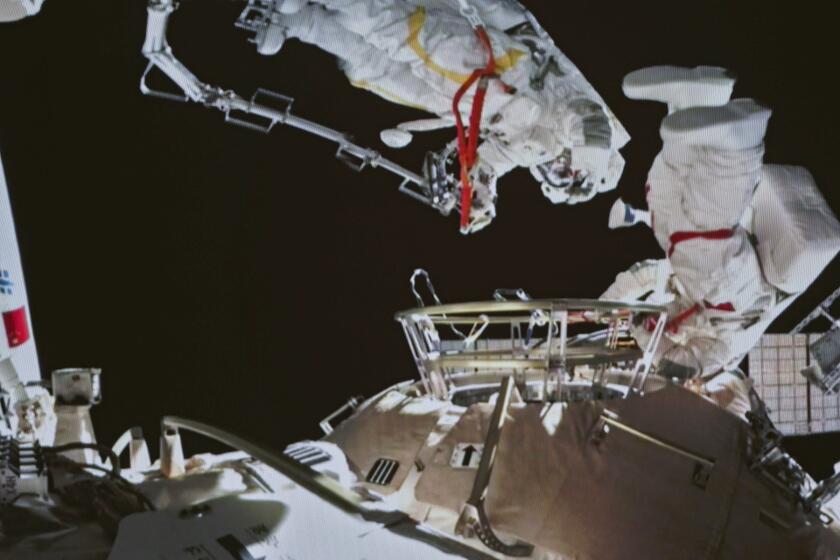U.S. astronaut catches ride back to Earth in Russian capsule after record spaceflight

- Share via
A NASA astronaut caught a ride back to Earth on Wednesday after a U.S. record 355 days at the International Space Station, returning with two cosmonauts in a Russian capsule to a world torn apart by war.
Mark Vande Hei landed in a Soyuz capsule in Kaz-akhstan alongside the Russian Space Agency’s Pyotr Dubrov, who also spent the last year in space, and Anton Shkaplerov. Wind blew the capsule onto its side after touchdown, and the trio emerged into the late afternoon sun one by one.
Vande Hei, the last one out, grinned and waved as he was carried to a reclining chair out on the Kazakh steppe.
“Beautiful out here,” said Vande Hei, putting on a face mask and baseball cap.
Despite escalating tensions between the U.S. and Russia over the war in Ukraine, Vande Hei’s return followed customary procedures.
A small NASA team of doctors and other staff was on hand for the touchdown and planned to return immediately to Houston with the 55-year-old astronaut.
Even before Russia’s Feb. 24 invasion of Ukraine, Vande Hei said he was avoiding the subject with his two Russian crew mates. Despite getting along “fantastically ... I’m not sure we really want to go there,” he said.
Space junk is threatening the seven astronauts aboard the International Space Station and interrupting their work.
It was the first taste of gravity for Vande Hei and Dubrov since their Soyuz launch on April 9 last year. Shkaplerov joined them at the orbiting lab in October, escorting a Russian film crew up for a brief stay.
To accommodate that visit, Vande Hei and Dubrov doubled the length of their stay.
Before leaving the space station, Shkaplerov embraced his fellow astronauts as “my space brothers and space sister.”
“People have problem on Earth. On orbit ... we are one crew,” Shkaplerov said in a live NASA TV broadcast Tuesday. The space station is a symbol of “friendship and cooperation and ... future of exploration of space.”
The war tensions have bubbled over in other areas of space, with the suspension of European satellite launches on Russian rockets and the Europe-Russia Mars rover stuck on Earth for another two years.
A problem with a newly docked Russian science lab briefly knocked the International Space Station out of position
Vande Hei surpassed NASA’s previous record for the longest single spaceflight by 15 days.
Dubrov moved into Russia’s top five, well short of the 437 days and 17 hours put in by Valery Polyakov, a cosmonaut-physician aboard the 1990s Mir space station, which remains the world record.
“Broken records mean we’re making progress,” said retired astronaut Scott Kelly, NASA’s previous space endurance champ, whose 340-day mission ended in 2016.
Like Kelly, Vande Hei underwent medical testing during his long stay to further NASA’s quest to get astronauts back to the moon and on to Mars.
He said daily meditation helped him cope during the mission, twice as long as his first station stint four years earlier.
“I’ve had an indoor job 24/7 for almost a year, so I am looking forward to being outside no matter what kind of weather,” Vande Hei said in a recent NASA video. As for food, he’s looking forward to making a cup of coffee for himself and his wife, Julie, and digging into guacamole and chips.
Wang Yaping has become the first Chinese woman to conduct a spacewalk as part of a six-month mission to China’s space station.
Remaining on board the space station are three Russians who arrived two weeks ago, plus three Americans and one German who have been aboard since November. Their replacements are due in three weeks via a SpaceX rocket. Next week, SpaceX will fly three rich businessmen and their ex-astronaut escort to the station for a weeklong visit arranged by the private firm Axiom Space.
Elon Musk’s SpaceX began transporting NASA astronauts to the station in 2020, nine years after the space shuttle program ended. During that gap, Russia offered the lone taxi service, with NASA shelling out tens of millions of dollars per Soyuz seat. Vande Hei’s ride was part of a barter exchange with Houston-based Axiom.
More to Read
Sign up for Essential California
The most important California stories and recommendations in your inbox every morning.
You may occasionally receive promotional content from the Los Angeles Times.
















